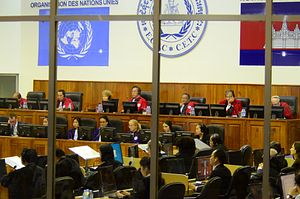As we begin the last public hearings by the Extraordinary Chambers in the Courts of Cambodia (ECCC), also known as the Khmer Rouge Tribunal, it is important to consider not only the important work of the ECCC but also the great tasks that lie before us.
The ECCC depends on the survivors of the Khmer Rouge for its existence. The survivors’ demands for a court were important to the ECCC’s establishment, and even though it has taken far too long to establish the court, and far too long for the court to complete its work, the survivors exercise patience, because they truly want to give the court legitimacy even up to its last hearing.
The ECCC secured the conviction of the former commandant of the S-21 extermination center, and two of the most senior leaders of the regime, the former “brother number two,” Nuon Chea, and the former head of state, Khieu Samphan. Of course, whereas the court will be remembered by the convictions it achieved, it will also be remembered by the judgments that it never rendered.
But we would be wrong to judge the importance of the ECCC based solely upon its convictions. In so many ways, the court has helped shed light on a dark chapter in history, and it has influenced, if not directly contributed to, many other dimensions of justice that Cambodian society sorely needs. The court has given civil parties, including many victims of the Khmer Rouge regime, an opportunity to speak and describe their personal and family’s experiences. Likewise, the ECCC established a detailed legal record on how genocide, crimes against humanity, and many other atrocities were perpetrated. And, without question, the ECCC has helped Cambodian society not only confront its history but embrace it as a tragic lesson that can inform Cambodians as well as the entire world.
During their regime (1975-1979), the Khmer Rouge made every effort to destroy culture, family, and even memory. Ultimately, their warped ideology led to the death of more than 2 million Cambodians. When the court shutters its doors, we must not cease our effort in memorializing, studying, and disseminating the lessons of this history within Cambodia and the world.
It is often mistakenly said that “history is written by the victors.” This is not true, and Cambodia’s history vindicates this point. The survivors of the Khmer Rouge were not the victors, but they are heroes, and as heroes, we must capture their oral history. Most history originates as oral history, and we must recognize the important role that oral history plays in the great tasks that lie before us.
The impending closure of the court must be recognized as the beginning of a new chapter in Cambodia’s search for justice. This new chapter for Cambodians must undertake new endeavors, which the ECCC could not address. We must care for the survivors of the Khmer Rouge, consisting of at least 5 million persons, who are among the most vulnerable populations in Cambodia. We must continue to build on the historical record – collecting the oral history of the Khmer Rouge survivors, which in itself is a process of healing and reconciliation – and we must work to establish this record as a lesson for future Cambodian youth and the world.
Ultimately, when the ECCC closes, our work is not over. We must work earnestly to reimagine a Cambodian society that embraces its tragic history, not as victims but heroic survivors, committed to a peaceful, prosperous, and democratic future.

































